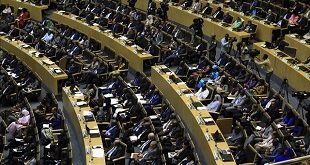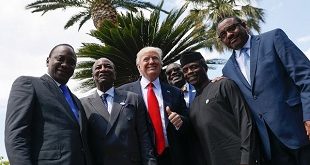
By Angela Merkel and François Hollande
A call for a fundamental shift to low-carbon infrastructure, technologies, land use
France, incoming Presidency of COP 21, and Germany, Presidency of the G 7, are firmly decided to take all efforts to reach an ambitious, comprehensive and binding UN climate agreement by the end of this year in Paris. We invite all countries to join us in this endeavor by doing their part in accordance with their common but differentiated responsibilities and capabilities and in light of different national circumstances. We are committed to the goal of limiting global temperature increase at least to below 2°C compared with pre-industrial levels. Urgent action and an ambitious global framework are needed to put us on a path consistent with this goal. We need a fundamental shift of investments into low-carbon infrastructure, technologies and climate friendly land use. At the same time, we have to strengthen the resilience especially of the particularly vulnerable countries against unavoidable risks and damage arising from climate change. We are convinced that investments, strategies and legislation to achieve this transformation will foster prosperity, growth and sustainable development worldwide.
In particular, Germany and France call for action in the following areas:
Establishing a shared vision and concrete action for a profound transformation of the world economy and society, to achieve full decarbonisation over the course of this century and reduce emissions by 2050 to a level compatible with the recommendations of the IPCC’s Fifth Assessment Report, while taking into account the concerns voiced by many vulnerable countries that global warming should be maintained under 2°C or 1,5°C in accordance with the Durban mandate.
Submitting ambitious and transparent nationally-determined climate contributions (INDCs) well before the UN climate conference in Paris.
Advancing long-term national and regional strategies for low-carbon and resilient development, as agreed upon at COP 16 in Cancun.
Mobilising climate finance for developing countries reaching USD 100 billion per year goal by 2020 from a wide variety of sources, both public and private, for action on mitigation and adaptation, in accordance with the commitment made by developed countries at COP 15 in Copenhagen.
Strengthening support for low-carbon development and climate resilience in our development assistance.
Establishing initiatives for investment in low-carbon technologies, especially in renewable energies and resource efficiency, and sustainable land use. There should be a specific focus on the development of renewable energies in Africa.
Strengthening adaptation and resilience of the particularly vulnerable countries against climate change, including small island developing states, Africa, Asia, Latin America and the Caribbean, through the spread of insurance mechanisms and national early warning systems.
Introducing carbon markets and pricing on national and regional level with the aim of giving strong economic incentives for low-carbon transformation.
As the common vision we seek to pursue with all partners in the UN, we will strive to decarbonize fully the global economy over the course of this century. We commit ourselves to contribute our fair share, take ambitious actions and foster future-oriented collaboration in all of the areas above.
Our countries will continue to show leadership in this profound transformation of our economies and our societies towards full decarbonisation. We are committed, through the Energiewende in Germany and the “transition énergétique” in France, to reduce our greenhouse gas emissions by 80 to 95 % in 2050 compared to 1990.
Submitting ambitious and transparent nationally-determined climate contributions (INDCs) well before the UN climate conference in Paris.
Advancing long-term national and regional strategies for low-carbon and resilient development, as agreed upon at COP 16 in Cancun.
Mobilising climate finance for developing countries reaching USD 100 billion per year goal by 2020 from a wide variety of sources, both public and private, for action on mitigation and adaptation, in accordance with the commitment made by developed countries at COP 15 in Copenhagen.
Strengthening support for low-carbon development and climate resilience in our development assistance.
Establishing initiatives for investment in low-carbon technologies, especially in renewable energies and resource efficiency, and sustainable land use. There should be a specific focus on the development of renewable energies in Africa.
Strengthening adaptation and resilience of the particularly vulnerable countries against climate change, including small island developing states, Africa, Asia, Latin America and the Caribbean, through the spread of insurance mechanisms and national early warning systems.
Introducing carbon markets and pricing on national and regional level with the aim of giving strong economic incentives for low-carbon transformation.
As the common vision we seek to pursue with all partners in the UN, we will strive to decarbonise fully the global economy over the course of this century. We commit ourselves to contribute our fair share, take ambitious actions and foster future-oriented collaboration in all of the areas above.
Our countries will continue to show leadership in this profound transformation of our economies and our societies towards full decarbonization. We are committed, through the Energiewende in Germany and the “transition énergétique” in France, to reduce our greenhouse gas emissions by 80 to 95 % in 2050 compared to 1990.
****
Angela Merkel is the Chancellor of Germany and François Hollande is the president of France.
 The Independent Uganda: You get the Truth we Pay the Price
The Independent Uganda: You get the Truth we Pay the Price


